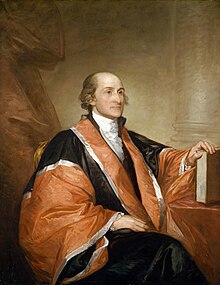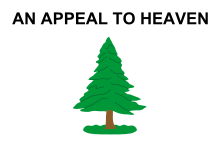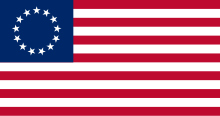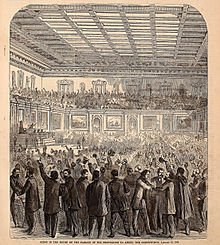John Jay
chief justice of the United States from 1789 to 1795
John Jay (12 December 1745 – 17 May 1829) was an American politician, statesman, revolutionary, diplomat, and jurist, who was one of the Founding Fathers of the United States of America.









Quotes edit
- Slaves, though held by the laws of men, are free by the laws of God.
- As quoted in "The Present Aspect of the Slavery Question" (18 October 1859), by George William Curtis, Orations and Addresses of George William Curtis.
1770s edit
- No power on earth has a right to take our property from us without our consent.
- Address to the People of Great Britain, drafted by Jay and approved by the First Continental Congress (21 October 1774); as contained in American Eloquence: A Collection of Speeches and Addresses by the Most Eminent Orators of America, Volume 1, ed. Frank Moore, D. Appleton (1872), p. 159
- The Americans are the first people whom heaven has favoured with an opportunity of deliberating upon and choosing forms of government under which they should live.
Letter to Lindley Murray (1774) edit
- Among the strange things of this world, nothing seems more strange than that men pursuing happiness should knowingly quit the right and take a wrong road, and frequently do what their judgments neither approve nor prefer. Yet so is the fact; and this fact points strongly to the necessity of our being healed, or restored, or regenerated by a power more energetic than any of those which properly belong to the human mind.
We perceive that a great breach has been made in the moral and physical systems by the introduction of moral and physical evil; how or why, we know not; so, however, it is, and it certainly seems proper that this breach should be closed and order restored. For this purpose only one adequate plan has ever appeared in the world, and that is the Christian dispensation. In this plan I have full faith. Man, in his present state, appears to be a degraded creature; his best gold is mixed with dross, and his best motives are very far from being pure and free from earth and impurity.- Letter to Lindley Murray (22 August 1774), as published in The Life of John Jay (1833) by William Jay, Vol. 2, p. 345.
1780s edit
- The Bible is the best of all books, for it is the word of God and teaches us the way to be happy in this world and in the next. Continue therefore to read it and to regulate your life by its precepts.
- Letter to Peter Augustus Jay (April 9, 1784). (citation needed, no such quotation exists in his letters collected by the National Archive)
- Our people had been so long accustomed to the practice and convenience of having slaves, that very few among them even doubted the propriety and rectitude of it. Some liberal and conscientious men had indeed, by their conduct and writings, drawn the lawfulness of slavery into question.
Letter to Reverend Doctor Price (1785) edit
- That men should pray and fight for their own freedom, and yet keep others in slavery, is certainly acting a very inconsistent, as well as unjust and, perhaps, impious part, but the history of mankind is filled with instances of human improprieties.
Letter to R. Lushington (1786) edit
- It is much to be wished that slavery may be abolished. The honour of the States, as well as justice and humanity, in my opinion, loudly call upon them to emancipate these unhappy people. To contend for our own liberty, and to deny that blessing to others, involves an inconsistency not to be excused.
The Federalist Papers edit
Federalist No. 2 (1787) edit
- "Federalist No. 2" (31 October 1787), The Federalist Papers.
- With equal pleasure I have as often taken notice, that Providence has been pleased to give this one connected country, to one united people; a people descended from the same ancestors, speaking the same language, professing the same religion, attached to the same principles of government, very similar in their manners and customs, and who, by their joint counsels, arms and efforts, fighting side by side throughout a long and bloody war, have nobly established their general Liberty and Independence.
- This country and this people seem to have been made for each other, and it appears as if it was the design of Providence, that an inheritance so proper and convenient for a band of brethren, united to each other by the strongest ties, should never be split into a number of unsocial, jealous, and alien sovereignties.
- Similar sentiments have hitherto prevailed among all orders and denominations of men among us. To all general purposes we have uniformly been one people; each individual citizen everywhere enjoying the same national rights, privileges, and protection. As a nation we have made peace and war: as a nation we have vanquished our common enemies: as a nation we have formed alliances, and made treaties, and entered into various compacts and conventions with foreign States.
Federalist No. 4 (1787) edit
- It is too true, however disgraceful it may be to human nature, that nations in general will make war whenever they have a prospect of getting anything by it; nay, absolute monarchs will often make war when their nations are to get nothing by it, but for the purposes and objects merely personal, such as thirst for military glory, revenge for personal affronts, ambition, or private compacts to aggrandize or support their particular families or partisans. These and a variety of other motives, which affect only the mind of the sovereign, often lead him to engage in wars not sanctified by justice or the voice and interests of his people.
- Federalist No. 4 (7 November 1787) Full text from Wikisource.
Federalist No. 5 (1787) edit
- "Federalist No. 5" (10 November 1787), The Federalist Papers.
- Distrust naturally creates distrust, and by nothing is good-will and kind conduct more speedily changed than by invidious jealousies and uncandid imputations, whether expressed or implied.
1790s edit
- Every man of every color and description has a natural right to freedom.
- As quoted in George Clinton: Yeoman Politician of the New Republic, by John P. Kaminski, p. 205
- It is presumed, that juries are the best judges of facts; it is, on the other hand, presumed that courts are the best judges of law. But still both objects are within your power of decision ... You have a right to take it upon yourselves to judge of both, and to determine the law as well as the fact in controversy.
- Georgia vs. Brailsford (1794)
1810s edit
Letter to John Murray (1816) edit
- It certainly is very desirable that a pacific disposition should prevail among all nations. The most effectual way of producing it, is by extending the prevalence and influence of the gospel. Real Christians will abstain from violating the rights of others, and therefore will not provoke war.
Almost all nations have peace or war at the will and pleasure of rulers whom they do not elect, and who are not always wise or virtuous. Providence has given to our people the choice of their rulers, and it is the duty, as well as the privilege and interest, of our Christian nation to select and prefer Christians for their rulers.- Letter to John Murray (12 October 1816) as published in The Life of John Jay (1833) by William Jay, Vol. 2, p. 376
Quotes about Jay edit
- With the sure sagacity of a leader of men, Washington at once selected, for the highest and most responsible stations, the three chief Americans who represented the three forces in the nation which alone could command success in the institution of the government. Hamilton was the head, Jefferson was the heart, and John Jay was the conscience. Washington's just and serene ascendancy was the lambent flame in which these beneficent powers were fused, and nothing less than that ascendancy could have ridden the whirlwind and directed the storm that burst around him.
- George William Curtis, as quoted in Manual Of Patriotism: For Use in the Public Schools of the State of New York (1900) By Charles Rufus SkinnerTake, p. 261.
- By this constitution [NY State 1777] the right of suffrage was, in several instances, restricted to freeholders; it being a favourite maxim with Mr. Jay, that those who own the country ought to govern it.
- Son William Jay in The Life of John Jay (1833), volume I, chapter III.
External links edit
- Jay Heritage Center
- Jay's Treaty, Library of Congress
- Federalist #2 Concerning Dangers from Foreign Force and Influence
- Federalist #3 Concerning Dangers from Foreign Force and Influence (continued)
- Federalist #4 Concerning Dangers from Foreign Force and Influence (continued)
- Federalist #5 Concerning Dangers from Foreign Force and Influence (continued)
- Federalist #64 The Powers of the Senate
- John Jay, Supreme Court Historical Society
- U.S. Supreme Court media on John Jay.
- Works by John Jay at Project Gutenberg
- John Jay at MetaLibri
- John Jay bust, by John Frazee (1790-1852), Marble, circa 1831, Size: 24" h., Catalog No. 21.00010, S-141, Old Supreme Court Chamber, U.S. Senate Collection, Office of Senate Curator.
- Essay: John Jay and the Constitution
- The Papers of John Jay
- John Jay Bio